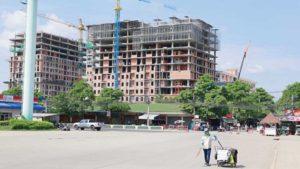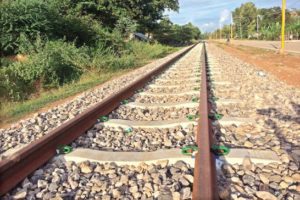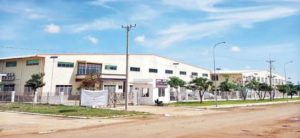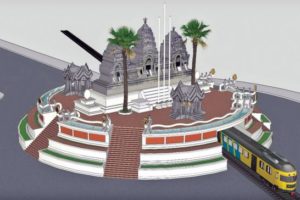
Cranes rise above a large casino complex under construction in Poipet in 2015.
Poipet border town on fast track for development
The imminent completion of a rail link between Thailand and Cambodia and the opening of two new international border crossings have renewed prospects for commercial growth in Poipet and pushed up real estate prices.
Poipet’s image as a rough-and-tumble casino town is slowly giving way to its development as a vibrant commercial and industrial centre. Often only glimpsed from passing vehicles, the northwestern border town is larger than it appears, with a population of 100,000 and development spread out over 262 square kilometres – an area about a third the size of Phnom Penh.

Freshly laid railway track near Serei Saophoan, part of a project to rebuild a rail line to Thailand via Poipet.
While casinos are the most visible aspect of its economy, commerce and industry are driving the latest boom in development. Real estate experts attribute four key ingredients to a recent flurry of construction: a nearly completed railway link to Thailand, the government’s plans to open more border crossings, an influx of foreign investment, and a new Chinese-funded belt road along the Cambodian-Thai border.
Sear Chailin, CEO of CL Realty, said Poipet occupies the main trade route between Cambodia and Thailand and is the country’s busiest border crossing for both domestic and foreign tourists. He said Asean integration has lifted tariffs and cross-border trade is thriving, bringing new economic prosperity to the city. It has also attracted industries, with new factories clustered in three special economic zones (SEZs) that lie just north of National Road 5.

“These many advantages have boosted property prices in Poipet, pushing them even higher than those of other border crossing areas in Cambodia,” Chailin said.
Tan Yim Chhay, vice chairman of Chhay Chhay Investment (CCI), the investment company that is developing Poipet O’neang Special Economic Zone (POSEZ), said the economic situation in Poipet is improving and the area is now seeing an influx of foreign capital. He said international investors have been sinking money into developing factories, hotels, casinos, restaurants and residential projects.
“The economic condition in Poipet is gradually improving because it now has a wide range of infrastructure,” he said.
“Better still, a railway connection between Cambodia and Thailand will officially open soon.”
Chan Samleng, spokesman of the Ministry of Public Works and Transport, said progress on rebuilding a 54-kilometre stretch of railway between the Cambodian town of Serei Saophoan and the Thai border city of Aranyaprathet via Poipet is 95 percent completed. The rail line was heavily damaged during Cambodia’s civil war and restoration work begun in 2009 has stumbled on negotiations to resettle families living along its tracks.

A factory in the Poipet O’neang Special Economic Zone (POSEZ)
“Previously, there were more than 1,000 families that we needed to deal with, but now there are just five families left,” he said.
“I don’t think it will take long to resolve and everything should be finished by the end of February.”
Chhay said the imminent restoration of railway service between Cambodia and Thailand has driven real estate prices higher in Poipet. Trade and investment are also rising on the government’s plans to open two new border crossings near Poipet at O’neang and Steung Bot to connect with Thailand’s Sa Kaeo province.
The improved border access, as well as a newly opened Chinese-funded highway connecting Poipet and Oddar Meanchey province, is attracting foreign investors.

Poipet’s new governor waters down a street in the city to show he is serious about cleaning up Poipet’s image.
POSEZ, an industrial park occupying 467 hectares of land in O’Chrov district, now has three factories in operation, according to Chhay. Tenants include a clothing factory, a footwear plant and a jewellery workshop that is a joint-venture between Thai and Chinese investors.
Nearby Sanco Poipet Special Economic Zone (Sanco SEZ), an industrial park on 83 hectares, has attracted 10 tenants. Among these are several international companies with existing factories in Thailand that have established an additional factory in Cambodia to mitigate risk and utilise the country’s pool of cheap labour.
Chhour Vichet, CEO of Sanco Cambo Investment Group Co Ltd, the Cambodian-Japanese joint venture that operates Sanco SEZ, said news of better connectivity with Thailand has made Poipet a magnet for foreign investment.
“According to leaked information, the government is planning to open the Steung Bot border crossing in 2019,” he said. “When this crossing opens everything [in Poipet] will benefit, including trade and real estate.”
 According to 2017 research by CL Realty, commercial-zoned land located along main roads in Poipet sells for between $500 and $1,000 per square metre. Undeveloped residential land, as well as industrial plots, fetch between $100 and $500 per square metre.
According to 2017 research by CL Realty, commercial-zoned land located along main roads in Poipet sells for between $500 and $1,000 per square metre. Undeveloped residential land, as well as industrial plots, fetch between $100 and $500 per square metre.
San Sean Ho, the newly appointed governor of Poipet, said his office has prioritised infrastructure projects to support the city’s property boom, and is “gearing up for more development projects to convert Poipet into a magnet for both residents and investors”.
He said the city’s rapid development has led to a spike in property prices in some areas, with properties adjacent to casinos reaching as much as $1,000 per square metre. Residential property is also hot, he said, adding that the city has 10 borey (gated residential communities) projects and an additional 50 companies sub-dividing residential plots for resale.
However, Sroy Thida, owner of Borey Sok Sreng in Poipet, said houses in boreys were not selling as well as hoped. She suggested buyers may be turned off by inflated prices and the government’s plan to promote industry.
“Land prices in Poipet have doubled or even tripled compared to last year,” she said.
“This surge in price is because the government plans to develop Poipet as a hub of big factories and industry.”
She noted, however, that smaller undeveloped residential plots were still selling well, with prices ranging between $2,000 and $5,000.
Source: http://www.phnompenhpost.com/supplements-post-property/border-town-fast-track-development


